Cooking a delicious Indian dish without cooking oil is next to impossible. Cooking oil is part of the process for tempering, sauteing, frying, roasting or even baking. Can we have a cooking oil that is best for the food as well as in health?
The answer is yes.
The question is how can a homemaker know all those details?
What kind of cooking oil is vital in various kinds of cooking processes. Also, choosing the right kind of cooking oil can spare you from many diseases like heart, cholesterol, stomach diseases, etc. So many health and obesity issues running these days, it’s is obvious and necessary for mothers and wives to worry about the oil they use for cooking the food for their family.
We have done the research for you.
We have done the study on 11 different types of oils. For each oil, we have shared the health benefits along with the side effects. Moreover, each benefit or side-effect is backed by the research papers. On top of that, we have chosen the brands that provide oils in each of those categories. The preference to select a brand is based on the list of available nutrients that show no cholesterol, has no preservatives and no trans-fat.
Buying Guide in a Snapshot
| Image | Brands | Mono Poly Sat* |
Omega 3 & 6 | Cholesterol Preservatives Trans fat |
Best Before | Extraction methods | Ingredients | Vitamins | Price |
|---|---|---|---|---|---|---|---|---|---|

|
Disano Canola Oil | 63gm 32gm 7gm |
11gm N/A |
0mg No No |
24 months | Refined | Canola Oil | E (18mg) | |

|
Borges Canola Oil | 60gm 33gm 7gm |
6gm N/A |
0mg No No |
36 months | Refined | Canola Oil | E (20mg) | |

|
Nature Fresh Acti Heart Canola Oil | 54gm 30gm 16gm |
Yes N/A |
0mg No <1.5gm |
9 months | Blended | 50% Rice bran Oil, 50% Canola Oil | A(750mcg), D (12 mcg), & E (273mcg) | |

|
Jivo Canola Oil | 62gm 31gm 7gm |
11gm 20gm |
0mg No No |
24 months | Refined | Canola Oil | N/A | |
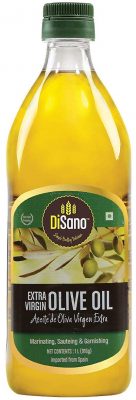
|
Disano extra virgin olive Oil | 68.7gm 9.2gm 13.7gm |
N/A N/A |
0mg No No |
24 months | Extra virgin | Olive Oil | N/A | |

|
Borges extra virgin olive Oil | 75gm 10gm 15gm |
N/A N/A |
0mg No No |
24 months | Extra virgin | Olive Oil | N/A | |

|
Figaro extra virgin olive Oil | 78gm 7gm 15gm |
N/A N/A |
0mg No No |
18 months | Extra virgin | Olive Oil | N/A | |
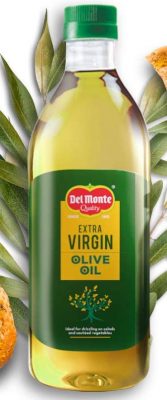
|
Del monte extra virgin olive Oil | 69.6gm 9gm 13gm |
N/A N/A |
0mg No No |
24 months | Cold-Pressed and unprocessed | Olive Oil | N/A | |

|
Saffola aura refined olive Oil | 64gm 23gm 13gm |
8gm N/A |
0mg No No |
15 months | Refined | 80% olive oil, 20% flaxseed Oil | E (45mg) | |
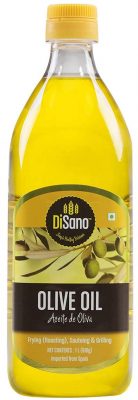
|
Disano pure olive Oil | 68.7gm 9.2gm 13.7gm |
N/A N/A |
0mg No No |
24 months | Refined | 85% refined olive oil, 15% extra virgin olive Oil | N/A | |
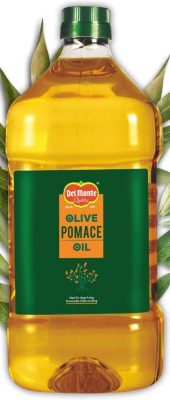
|
Del monte Olive Pomace Oil | 69.6gm 9gm 13gm |
N/A N/A |
0mg No No |
24 months | Refined | Olive Pomace Oil & virgin olive Oil | N/A | |
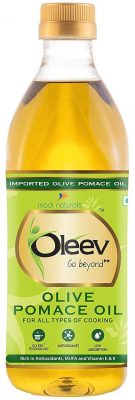
|
Oleev Olive Pomace Oil | 75gm 10gm 15gm |
N/A N/A |
0mg No No |
24 months | N/A | Olive Pomace Oil | E. (14.35mg) K (62mg) | |

|
Orino Olive Pomace Oil | 71.42gm 14.28gm 14.28gm |
N/A N/A |
0mg No No |
24 months | Refined | Olive Pomace Oil & extra virgin olive Oil | N/A | |

|
Disano Pomace Oil | 68.7gm 9.2gm 13.7gm |
N/A N/A |
0mg No No |
24 months | Refined | 95% refined olive Pomace Oil & 5% extra virgin olive Oil | N/A | |
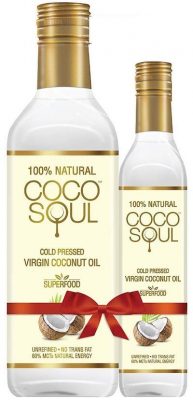
|
Coco soul Cold-Pressed virgin coconut Oil | N/A N/A N/A |
N/A N/A |
0mg No No |
N/A | Cold-Pressed | N/A | N/A | |

|
Max cold-pressed virgin coconut Oil | N/A N/A 13gm |
N/A N/A |
0mg No No |
24 months | Cold-Pressed | Coconut Oil | N/A | |
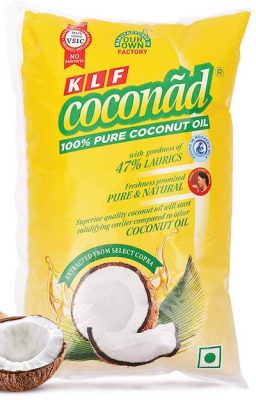
|
KLF coconad pure coconut Oil | 7gm 2gm 91gm |
N/A N/A |
0mg No No |
9 months | VSIC technology | Coconut Oil | N/A | |

|
Pure and Sure organic coconut Oil | 6gm 18gm 86gm |
N/A N/A |
0mg No No |
N/A | Cold-Pressed | Coconut Oil | N/A | |

|
Black and green extra virgin Avocado Oil | 69gm 9gm 13gm |
Yes Yes |
0mg No No |
36 months | Cold-Pressed | Avocado Oil | E | |

|
Healthy muse cold-pressed Avocado Oil | 72gm 14gm 14gm |
Yes N/A |
0mg No No |
24 months | Cold-Pressed | Avocado Oil | E | |

|
Puvi cold-pressed sesame Oil | 39.16gm 46.30gm 10.57gm |
N/A N/A |
0mg No No |
9 months | Cold-Pressed | Sesame seeds Oil | N/A | |

|
Farm Naturelle cold-pressed sesame Oil | 40gm 42gm 14gm |
N/A N/A |
0mg No No |
12 months | Cold-Pressed | Sesame seeds Oil | N/A | |

|
Puvi cold-pressed groundnut Oil | 38.65gm 44.1gm 14gm |
N/A N/A |
0mg No No |
9 months | Cold-Pressed | Groundnut Oil | N/A | |
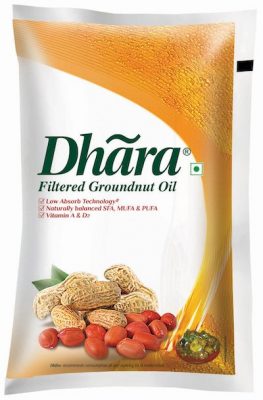
|
Dhara groundnut Oil | 54gm 28gm 18gm |
N/A N/A |
0mg No No |
8 months | Filtered | Groundnut Oil | A (750mcg), D (11.25mcg) | |
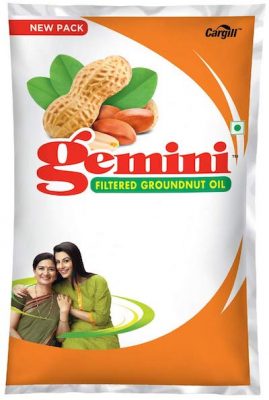
|
Gemini groundnut Oil | 51.2gm 27.6gm 20.9gm |
N/A N/A |
0mg No No |
9 months | Filtered | Groundnut Oil | N/A | |
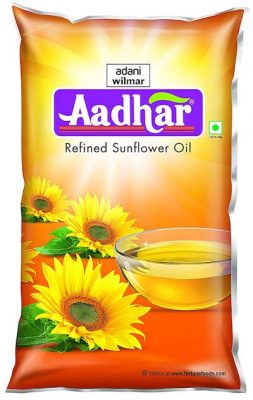
|
Aadhar refined sunflower Oil | 26gm 60gm 12gm |
N/A N/A |
0mg No No |
9 months | Refined | Sunflower Oil | A (750mcg), D (11.25mcg) | |

|
Fortune Sunlite sunflower Oil | 14gm 49gm 17gm |
N/A N/A |
0mg No No |
9 months | Refined | Sunflower Oil | A (750mcg), D (11.25mcg) | |

|
Daana premium cold-pressed sunflower Oil | N/A N/A N/A |
N/A N/A |
0mg No No |
N/A | Cold-Pressed | Sunflower Oil | N/A | |

|
Sundrop lite sunflower Oil | 28gm 60gm 12gm |
0.10gm 40..60gm |
0mg No No |
N/A | Blended | 80% Sunflower Oil, 20% soybean Oil | E, A (750mcg), D (11.25mcg) | |

|
Fortune soybean refined Oil | 17gm 53gm 21gm |
N/A N/A |
0mg No No |
9 months | Refined | Soybean Oil | A (750mcg), D (11.25mcg) | |
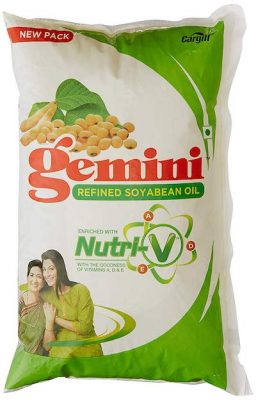
|
Gemini refined soybean Oil | 26.6gm 55.9gm 17.1gm |
N/A N/A |
0mg No No |
9 months | Refined | Soybean Oil | E (273mcg), A (750mcg), D (11.25mcg) | |
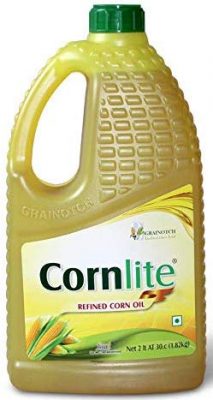
|
Cornlite pure corn Oil | 36.70gm 49.24gm 14.01gm |
N/A N/A |
0mg No No |
9 months | Refined | Corn Oil | A (750mcg), D (11.25mcg) | |
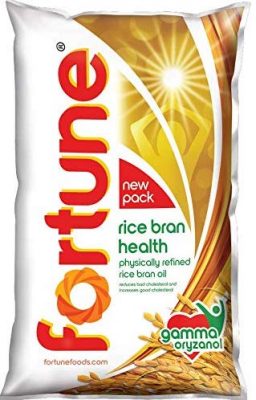
|
Fortune rice bran Oil | 38gm 22gm 31gm |
N/A N/A |
0mg No No |
9 months | Refined | Rice bran Oil | A (750mcg), D (11.25mcg) | |
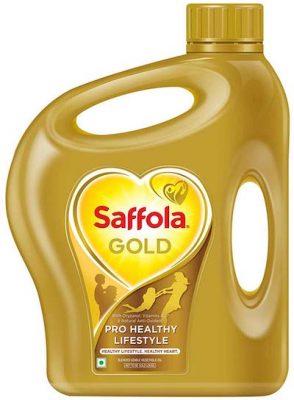
|
Saffola gold pro healthy rice bran Oil | 48gm 32gm 20gm |
N/A N/A |
0mg No No |
9 months | Blended | 80% rice bran oil, 20% safflower Oil | A (833mcg), D (150mcg) | |

|
Saffola total pro-health conscious rice bran Oil | 34gm 47gm 19gm |
N/A N/A |
0mg No No |
9 months | Blended | 70% rice bran oil, 30% safflower Oil | E (9mg) | |
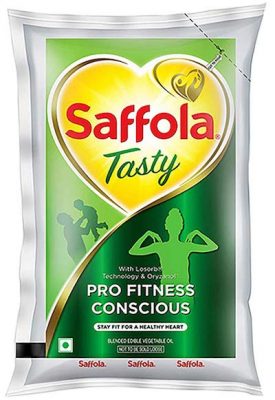
|
Saffola tasty rice bran Oil | 34gm 49gm 17gm |
N/A N/A |
0mg No No |
6 months | Blended | 60% corn oil, 40% rice bran Oil | A (750mcg), D (11.25mcg) | |
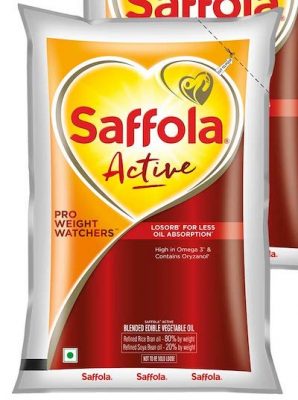
|
Saffola Active Pro Weight Watchers | 40.1gm 37.7gm 22.2gm |
Yes N/A |
0mg No No |
6 months | Blended | 80% rice bran oil, 20% safflower Oil | A (750mcg), D (11.25mcg) |
* Per 100gm

Borges
- Rich in omega- 3
- Lowest saturated fats
- All-in-one oil
- Lowers bad cholesterol
- Helps in brain functioning
- With the goodness of Rapeseed and Erucic acid oil

Figaro Extra Virgin
- Rich source of Vitamin E
- Full of Anti-oxidants
- Mantains cardio-circulatory system
- Regulate cholesterol level
- Suited for salad dressings, dips marinades and chutneys
- Imported from Spain
- It is free from Argemone Oil

Aadhar Refined
- Rich in Vitamin E
- Keeps skin healthy
- Fortified with vitamin A and vitamin D

Saffola Active Pro Weight Watchers
- Unique blend of 80% Refined rice bran oil and 20% soyabean oil.
- The goodness of two oils in one.
- Benefits of Antioxidants and LOSORB Technology.
- LOSORB Technology: Results in up to 27%* lesser oil absorption in your fried food (*Basis frying studies on potato, 2018).

Puvi Cold-Pressed
- Healthier substitute for refined oils.
- Suited for from sauteing to deep frying.
- It helps against premature aging.
- Assists skin to be wrinkle-free.
- Fresh full-grained groundnuts chosen for the best aroma.
- No-chemical production and storage
- Food’s natural flavor will remain unaltered
Types Of Fats In Cooking Oil
The proportion of fat is a major factor deciding to buy the best cooking oils in India. There are three kinds of fats in oil:
- Saturated fats – Saturated fatty acids have their carbon chain filled with hydrogen atoms. This saturation yields a highly stable structure that resists oxidation. Saturated fatty acids are found in palm oil and coconut oil. These oils and fats are best for deep-frying and cooking on extreme heat.
- Monounsaturated Fats – Monounsaturated fatty acids have one double bond between their two carbons. Moreover, these aren’t densely packed, they can’t be exposed to such high heat. It can be found in olive oil, avocado oil, and nut oils. There are many benefits like it lowers the heart diseases risk, good for weight-loss and is overall healthy.
- Polyunsaturated Fats – Polyunsaturated fats are a healthy fat that includes omega-3 and omega-6 fatty acids, which are essential for brain function. You must obtain from foods as your body cannot make it.
Types Of Nutrients In Cooking Oil
- Omega 3 – The body can make any type of fats but it cannot produce Omega 3 fatty acids. These are essential fat that the body needs. Omega 3 fatty acids are there in fish, vegetable oils, nuts, flaxseeds, and vegetables. As they are an important part of cell membranes. They regulate blood clotting as well.
- Omega 6 – Omega 6 Fatty acids are important to your body as it used for energy. It also helps in treating chronic diseases.
- Vital Vitamins – Vitamin A, D, E & K are the most common vitamins that are available in healthy cooking oils. It fulfills the deficiency in your body and provides stability.
You can read about each oil by clicking the link.
- Canola Oil
- Olive Oil
- Coconut Oil
- Avocado Oil
- Pumpkin Seed Oil
- Sesame Oil
- Groundnut Oil
- Sunflower Oil
- Soyabean Oil
- Corn Oil
- Rice Bran Oil
Frequently Asked Questions
Is canola oil better than olive oil?
Olive oil is healthier than canola oil as it contains high antioxidants and good for salad dressings. Whereas canola oil is good for everyday cooking as it has a high heating point.
Can I use canola oil instead of vegetable oil?
You can replace using canola oil instead of vegetable oil. Both are quite similar in content-wise as well.
Is canola oil safe to use?
Canola oil is safe to use. It contains high good fats and low bad fats. Also, it is high in monounsaturated & polyunsaturated fatty acids.
Is groundnut oil bad for health?
Groundnut oil contains 50% monounsaturated fat, 20% saturated fat and 30% polyunsaturated fat. Therefore, it contains a good fat source and a healthy oil to use in daily cooking.
Also, it contains vitamin E that is a good source of antioxidants.
Source: nutritiondata.self.com
Which is the best groundnut oil?
The best groundnut oil is cold-pressed oil.
Is groundnut oil increase cholesterol?
No. Groundnut oil is healthy cooking oil and lowers down bad cholesterol.
Source: ncbi.nlm.nih.gov
What are the benefits of olive oil?
Olive oil is high in monounsaturated fat, prevents heart stroke, rich in omega-3 fatty acids and has rich antioxidants.
Which olive oil is best?
Extra virgin olive oil is always the best to use. And for daily cooking, virgin olive oil works best.
How do you cook with olive oil?
One can use olive oil in salad dressings, sauteing, shallow frying or even dip bread in it.
Can I fry with olive oil?
Olive oil can’t be used for deep-frying. One can use it in shallow frying cooking.
Does olive oil cause cancer?
No, it does not. Olive oil is rich in antioxidants that help to case any major diseases to your body.
Can you fry an egg in olive oil?
Yes, one can fry eggs in olive oil without any doubt. Heat a non-stick pan with olive oil and make lots of egg recipes at home.
Is olive oil hard to digest?
Olive oil does not increase any fat in your body, especially when you use extra virgin olive oil.
Why coconut oil is bad for you?
Coconut oil contains high saturated fat which leads to high bad cholesterol. The fat in coconut oil is 92%.
Source: ncbi.nlm.nih.gov
Should you eat coconut oil every day?
Eating coconut oil every day is not a good idea. One should use it occasionally due to lots of saturated fat.
Source: ncbi.nlm.nih.gov
Does coconut oil increase cholesterol?
Coconut oil increases both good and bad cholesterol. It has more than 80%. saturated fat. Therefore, using it occasionally is fine but not is good for daily cooking.
Source: ncbi.nlm.nih.gov
Is corn oil bad for your health?
Corn oil contains Vitamin E and some good components. However, it has an imbalanced ratio of omega-3 and omega-6 fatty acids. So, it not healthy to use it in excessive amounts.
Is corn oil good frying?
Yes, corn oil can be used for frying because it’s low in monounsaturated fats and polyunsaturated fats.
Is rice bran oil good or bad for you?
Rice bran oil has a balanced amount of polyunsaturated fat, monounsaturated fat, and saturated fat. It’s good for a high smoking point. It is healthy cooking oil.
Which brand of rice bran oil is good?
Fortune rice bran cooking oil is best to use.
Is soybean oil good or bad for you?
Soybean oil has polyunsaturated fat which is good for heart health. It also contains omega-3 fatty acids which are again good for health.
What is soybean oil used in?
Soybean oil is used in salad dressing, roasting, cooking and baking food.
Is soybean oil inflammatory?
According to the research, some vegetable oils like soybean oil promote inflammation due to the high amount of omega 6 fatty acids.
What is sunflower oil used for?
Sunflower oil is pressed from the seeds of a sunflower. It is used in cooking for frying.
Is sunflower oil good for baking?
Sunflower oil has a high smoke point. Therefore, it is good to use in baking.
Is sunflower oil good for health?
Sunflower oil contains Vitamin E and A and is rich in monounsaturated fat. Therefore, it is healthy to use in cooking.
Is avocado oil a healthy oil?
Avocado oil consists of heart-healthy oleic acid and also an omega. 6 and 3 fatty acids. Moreover, it has a good source of antioxidants. Therefore, avocado oil is the healthiest oil.
Can you fry with avocado oil?
Avocado oil is the best high heat oil (smoke point: 500º F. One can use it for deep-frying as well.
Is avocado oil better than olive oil?
Both avocado oil and olive oil has benefits and includes healthy fats and antioxidants. These both oils are heart-healthy and contains healthy fat source as well.
What is pumpkin seed oil good for?
Pumpkin seed oil is rich in Vitamin E, zinc, omega-3 and omega-6 fatty acids. It has various health benefits like heart health, hair and skin improvement, and maintain urinary health.
What are the side effects of pumpkin seed oil?
Some side effects like constipation, diarrhea, the inability to have an erection, and inability to empty the bladder.
Is pumpkin oil bad?
Pumpkin oil is high in unsaturated fat and includes good fats. So, it is good for health.
What are the benefits of sesame seed oil?
Sesame seed oil is high in antioxidants, lower blood pressure, good for skin, help fight depression and protect against UV rays.
Which is better Sesame oil or olive oil?
Sesame oil is lower in vitamins compared to olive oil. Therefore olive oil is better than sesame oil and one can use it in daily cooking.
Is sesame oil bad for you?
Sesame oil is mostly used in salad dressing and soups. Therefore, the sesame seed oil usage is limited.
Canola Oil
Canola oil is a vegetable oil derived from the varieties of the Rapeseed plant. Belonging to the Brassicaceae family. It is low in erucic acid. There are edible and industrial forms of oils that are derived from these plants.
This oil is considered as one of the healthy and safe for human consumption. It is low in saturated fat and high in monounsaturated fat.
It has 7% saturated fat compared to 14% in olive oil, 9% in sunflower oil, and 13% in corn oil.
Health Benefits
High in good fats
Canola oil is rich in polyunsaturated fatty acids. It contains omega-3 fatty acids and omega-6 fatty acids. Moreover, it contains monounsaturated fats as well.
Source: Canola Council of Canada
Good for heart health
Due to low unsaturated fat content, Canola oil reduces the risk of any diseases like coronary.
Source: Canola Council of Canada
No Cholesterol
Canola oil is free of cholesterol.
Contains Vitamin E & K
Canola oil consists of vitamin E & K that helps for normal blood clotting. Also, it reduces skin problems like acne, lines, wrinkles, and spots.
High Heat Cooking Temperature
Due to the high smoke point, canola oil can be used in every type of cooking. It won’t burn the food until its cooked o 400º F. Also, the smoke point is an important factor to consider the best oil for daily consumption. It defines the oil is refined well.
Source: ncbi.nlm.nih.org
Release Joint Pain
Canola oil is high in monounsaturated fat and polyunsaturated fat. And these fats are needed to fight against joint pain.
Source: ncbi.nlm.nih.gov
Side Effects
High in Omega-6 Fatty Acids
Canola oil contains high omega-6 fatty acids and low in omega-3 fatty acids. So, the balance ratio should be 1:1 and here the balance ratio is 14:1. The high omega-6 fatty acid may lead to some chronic conditions like inflammation, obesity, and heart diseases.
Source: ncbi.nlm.nih.gov
Highly Refined
Canola oil has a high smoke point and it is highly refined. So, it decreases the nutrients in oil such as antioxidants, and important vitamins.
Source: ncbi.nlm.nih.gov
Olive Oil
Olive oil is a liquid fat derived from olives. Also, it is a tree crop of the Mediterranean Basin. It has wide usage in day to day cooking. Moreover, it is the most popular oil specially for diet plans and also one of the expensive oil.
It is not used for high smoke point cooking but mainly used for salad dressing. Also, one can use it to apply on skin for anti-aging or wrinkles as well.
Types of Olive Oil
There are five types of olive oil and the usage differs:
Extra Virgin Olive Oil
Extra virgin olive oil is the best among all olive oils. It uses the cold-pressed method to derive oil. Also, it is less processed olive oil and so it is full of antioxidants. It contains high MUFA and PUFA.
Virgin Oil
Virgin oil is in an unrefined form. It contains slight high acidity content. It is used for low heat cooking purposes.
Refined Olive Oil
Refined olive oil is derived from black olives. It is beneficial to health and helps fight against cancer.
Pure Olive Oil
Pure olive oil is blended from extra virgin oil. It contains a high amount of Vitamin E and less expensive than extra virgin olive oil. It’s not pure and because of the blending method, it loses its main antioxidants.
Olive Pomace Oil
Olive pomace oil the lowest quality olive oil. When the olive fruit is pressed, there is remained residue containing oil and water. It is used to make pomace oil. It is good for high heat cooking and contains very fewer antioxidants.
Health Benefits
Rich in Monounsaturated Fat
Olive oil consists of high monounsaturated fat. It is also called oleic acid. This acid helps in reducing inflammation and beneficial to cancer prevention as well.
They are quite high heat competitive and extra virgin olive oil is the healthiest cooking oil for daily use.
Source: ncbi.nlm.nih.gov
High Antioxidants
Olive consists of vitamin E and K and also loaded with high antioxidants. These antioxidants minimize the risk of many chronic diseases.
They protect blood circulation and prevent heart diseases as well.
Source: ncbi.nlm.nih.gov
Anti-Inflammatory
Inflammation may drive towards chronic diseases such as cancer, obesity or heart disease. Extra virgin olive oil protects human health through its anti-oxidants.
One of the antioxidants is oleocanthal, which works as an anti-inflammatory drug.
Source: ncbi.nih.nlm.gov
Prevent Brain Stroke
Stroke is caused due to disturbance of blood reaching the brain. It can be because of blood clots or bleeding inside.
Therefore, olive oil and stroke have the main relationship with each other. As. it is the only source of monounsaturated fat that helps in reducing the risk of heart diseases or stroke.
Source: ncbi.nlm.nih.gov
Prevent Alzheimer’s Disease
Alzheimer’s disease is a common neurodegenerative condition. It happens due to beta-amyloid plaques inside your brain cells.
According to research, olive oil helps remove these plaques but still, more research is needed at this point.
Source: ncbi.nlm.nih.gov
Reduces Type 2 Diabetes Risk
According to observational and clinical trials, it shows that olive oil affects blood sugar sensitivity.
Source: ncbi.nlm.nih.gov
Antibacterial Properties
Olive oil includes many nutrients properties that prevent certain bacteria in your stomach. One of the bacteria is helicobacter pylori, that lives in your stomach and may cause ulcer or stomach cancer.
Olive oil fights against these bacteria and works as antibiotics.
Source: ncbi.nlm.nih.gov
Side Effects
High in Calories and may Increase Weight
Olive oil contains 120 calories per tablespoon. Also, studies show that Increases monounsaturated fat can cause weight gain.
Source: ncbi.nlm.nih.gov
Causes Acne
Applying accessive olive oil on the skin can cause acne and harm your skin. Olive oil does not absorb quickly in your skin and creates a thick layer on it.
In that case, it turns your skin into the adhesive surface. It traps all the dirt and dust into it.
Source: ncbi.nlm.nih.gov
Coconut Oil
Coconut oil is extracted from coconut harvested from the coconut palm. It’s a unique combination of fatty acids that has a positive effect on your body.
It encourages to decrease the fat in the body and provide quick energy to the body and brain too.
Although coconut oil is high in saturated fats, the WHO (World Health Organization) organization has said to use it in limited quantity in your cooking.
Health Benefits
Improves Heart Health
Coconut oil contains more than 50% of lauric acids. A study suggests that this and absorbs easily in the intestine and also increases body energy.
The extra virgin coconut oil has a good cholesterol level and very less in bad cholesterol levels.
Source: ncbi.nlm.nih.gov
Helps in Alzheimer’s disease
Coconut oil contains healthy fatty acids that make the brain function better. The brain uses glucose as a source of energy. And in Alzheimer’s disease, the brain cells cannot easily absorb the glucose.
In that case, coconut oil is an alternative source of fuel to maintain brain health.
Source: ncbi.nlm.nih.gov
Helps Maintain Healthy Skin and Hair
Consuming coconut oil helps you moisturize your skin and prevent hair damage. It has antimicrobial properties. Also, it helps in the anti-aging process.
Moreover, it has vitamin E which protects your skin from sun damage. Also, our hair needs protein too keep it healthy and shine. Coconut oil provides moisturizer to hair to prevent from any damage.s
Source: ncbi.nlm.nih.gov
Helps Maintain Dental Health
The lauric acid helps any gum disease and protects dental health. Coconut oil can fight any type of bacteria in your mouth. Also, coconut oil can help the tooth loss.
Source: ncbi.nlm.nih.gov
Improves Bone Health
Coconut oil absorbs calcium and magnesium easily that are necessary for the bone. Also, it treats osteoporosis by increasing bone volume and bone loss.
Source: ncbi.nlm.nih.gov
Side Effects
Contains High Cholesterol
Coconut oil is high in saturated fat. It raises your bad cholesterol level which leads to heart diseases. Using in day to day cooking is a bad idea. Occasional use is always good even if it is being a plant-based oil.
Source: ncbi.nlm.nih.gov
Avocado Oil
Avocado oil is an edible oil pressed from the fruit of the Persea Americana. It is used in cooking oil as well as in many cosmetics.
It is pressed from fresh pulp of avocado pit. Moreover, it has a high smoke point, high in monosaturated fat, vitamin E, and increases absorption of nutrients.
Unlike other oils derived from seeds, Avocado is extracted from the fresh pulp surrounding the avocado pit. Moreover, it is low acidic, and best for deep-frying, stir-frying, and roasting.
Health Benefits
Contains Healthy Fats
Avocado oil is rich in oleic acid that is almost 70%, monounsaturated omega-9 fatty acids. Moreover, it also includes high omega-6 more than omega-3. The saturated fat in avocado oil is 12% and 13% polyunsaturated fat.
Source: nutritiodata.self.com
Help Reduce Cholesterol
Several studies are done on animals and their heart health. One study on rabbits has done where it shows that avocado oil is beneficial for bad cholesterol levels.
Also, avocado oil may help in reducing lower blood pressure. This study has been done on rats.
Source: ncbi.nlm.nih.gov
Beneficial for Eyes
Avocado oil is a good source of lutein, an antioxidant that is good for eyes. Eating plenty of lutein will reduce the risk of macular degeneration – a small central area of the retina of the eye that controls visual acuity.
Source: ncbi.nlm.nih.gov
Enhances the Absorption of Important Nutrients
Avocado oil is a healthy fat source. These are the carotenoid antioxidants. Generally, fresh vegetables and fruits are rich in carotenoids and low in fat.
Source: ncbi.nlm.nih.gov
Improves Skin and Increase Wound Healing
The fatty acids in avocado oil to improve your skin. It can treat skin injuries and may increase wound healing according to the research done on rats.
Source: ncbi.nlm.nih.gov
Helps Prevent Gum Disease
Some evidence suggests that inflammatory symptoms like bleeding gums, bad breath, and breakdown of bone around teeth.
In that case, Avocado oil block a protein that causes tissue and bone loss. It works as anti-inflammatory effects.
Source: ncbi.nlm.nih.gov
Neutralize Free Radicals
Antioxidants fight cellular damage. This is caused by free radicals that are waste products of metabolism.
However, a high level of free radicals may lead to oxidative stress that contributes to heart disease and diabetes.
Avocado oil can protect against free radicals by entering the mitochondria.
Source: ncbi.nlm.nih.gov
Side Effects
Avoid During Pregnancy and Breast-Feeding
Avocado may reduce milk production and can damage the mammary gland. If the mother consumes more avocado, the baby will have an upset stomach.
Source: ncbi.nlm.nih.gov
Pumpkin Seed Oil
Pumpkin seed oil is a culinary oil. It has a nutty taste, and rich in polyunsaturated fatty acids. Moreover, it is used for salad dressing as well. It has a good fat source and considered heart-healthy oil.
Health benefits
Boost Mood
Pumpkin seed oil boost mood and to avert depression according to the past findings.
Source:Cambridge.org
Good for Heart
Pumpkin seed oil is high in unsaturated fat. Therefore, good for heart health. One study on the animal has found that it has anti-inflammatory effects.
Source: ncbi.nlm.nih.gov
Maintain Urinary Health
The pumpkin seed oil has a positive impact on the urinary tract. According to the studies, consuming pumpkin seeds oil improves in overactive bladder and symptoms.
Source: ncbi.nlm.nih.gov
Helps Relieve Menopause Symptom
Pumpkin seed oil helps relieve the menopause symptom. It includes a decrease in hot flashes, headaches, and joint pains. The woman who takes pumpkin seed oil increases her HDL level that is good cholesterol.
Source: ncbi.nlm.nih.gov
Good for Hair and Skin
The pumpkin seed oil has a positive effect on hair growth.
Source: ncbi.nlm.nih.gov
Side Effects
May cause Low Blood Pressure
The pumpkin seed oil has antioxidants that may affect blood pressure. Individuals who have low blood pressure problems should avoid consuming pumpkin seed oil.
Source: ncbi.nlm.nih.org
Can Lead to Constipation
Pumpkin seed shells are high on insoluble fiber that can cause digestive problems like constipation.
Source: ncbi.nlm.nih.gov
Sesame Oil
Sesame oil is an edible cooking oil extracted from sesame seeds. In many dishes, it helps enhances the taste and gives a nutty aroma.
Generally, it is used as a flavoring in soups, sauces, and other Asian dishes. There are two types of sesame oil. The white sesame oil is light in color and used for high-heat and low flavor oil.
Whereas cold-pressed sesame oil is made without heat or chemicals. It is expensive because it is purest in this form.
Health Benefits
High Antioxidants
Sesame oil is rich in antioxidants and beneficial to your health. It contains sesamol and sesamol antioxidants as a property. Moreover, it helps reduce cell damage caused by free radicals.
Source: ncbi.nlm.nih.gov
Good for Heart
Sesame oil is rich in monounsaturated fats, that help reduces any risk to the heart. It contains 82% unsaturated fat. Also, it may lower your cholesterol.
It slows the development of plaque inside your arteries.
Source: ncbi.nlm.nih.gov
Control Blood Sugar
Sesame oil helps in long-term blood sugar regulation. It helps people with diabetes. A study is done in 46 adults consuming sesame oil for 90 days significantly reduced blood sugar levels and an increase in hemoglobin.
Source: ncbi.nlm.nih.gov
Protect Against UV Rays
Sesame oil has the ability to resist 30% of UV rays. It is a natural sunscreen that has a good SPF level. This effect is there due to its high antioxidants profile.
Source: ncbi.nlm.nih.gov
Side Effects
Increase Weight
The sesame seed oil is packed with calories. The saturated fat in this oil is around 80%. Therefore, one cannot incorporate it in daily cooking but only limited to salad dressings, soups or making sauces.
Source: ncbi.nlm.nih.gov
Can Cause Colon Cancer
According to studies, sesame seeds oil can cause colon cancer if you consume it at a high level.
Source: ncbi.nlm.nih.gov
Can Cause Allergic Reactions
When sesame seed oil at high heat, it extracts some allergies if you are sensitive from sesame.
Source: ncbi.nlm.nih.gov
Can Cause Allergic
Anaphylaxis can cause by sesame seed oil. The whole human body gets an allergic reaction. It may cause hypotension or chest tightness which blocks the person’s throat.
Source: ncbi.nlm.nih.gov
Groundnut Oil
Groundnut or Peanut oil is a popular vegetable oil used around the world. This oil has a high smoke point and popular choice for deep-frying as well.
A good source of vitamin E and helps to reduce heart disease risk and also improves blood sugar sensitivity. It comes in varieties like cold-pressed, roasted, refined, and unrefined. Moreover, it is mostly used in Asian culture.
Health Benefits
Controls Cholesterol Level
Groundnut oil is cholesterol-free due to the presence of plant sterols. It competes with cholesterol absorption in the stomach and gut.
Source: nutrition.org
Improves Blood Flow
Groundnut oil contains linoleic acid that is a precursor of prostaglandins. Prostaglandins are important to function in your body such as dilation of blood vessels.
Source: peanut-institute.com
Good for Heart
Groundnut oil contains Vitamin E. It can fight free radicals that cause cancer. The groundnut oil contains high monounsaturated fat and polyunsaturated fat. These are good fats and lower any chronic heart diseases.
Source: ncbi.nlm.nih.gov
Helps Relieve Joint Pain
Groundnut oil has therapeutic potential in treating joint pain. It is applied to skin beneficial for joint pains.
Source: ncbi.nlm.nih.gov
Enhance Cognitive Health
The vitamin E in groundnut oil can help health brain activity and also reduce anti-aging. Also, it can reduce Alzheimer’s diseases.
Source: ncbi.nl.nih.gov
Reduce Cancer Risk
Groundnut oil has anti-cancer potential properties. It contains Phytosterols that reduces the risk of cancer. This property can help reduce the risk of colon cancer.
Source: ncbi.nlm.nih.gov
Treat Dry Skin
Vitamin E improves the symptom of atopic dermatitis. This condition includes red and itchy skin. Not only the skin but also treats scalp psoriasis and maintains hair growth.
Source: ncbi.nlm.nih.gov
Side Effects
Contains Omega 6 Fatty Acid
Groundnut oil has a large amount of omega 6 fatty acids. However, consuming too much omega 6 fatty acids can cause heart problems. The ratio of omega-3 and omega-6 fatty acids should be equal.
It can cause cardiovascular inflammation.
Source: ncbi.nlm.nih.gov
Sunflower Oil
Sunflower oil is a pressed oil from the seeds of a sunflower. It is used as frying oil in Indian cooking. It has a high smoke point that is 232ºc.
Moreover, sunflower oil is composed of linoleic acid, polyunsaturated fat, oleic acid, and monounsaturated fat. Also, the oil contains Vitamin E, omega 6 and omega 9.
Health Benefits
Good for Skin
Sunflower oil is rich in Vitamin E and A that helps improve skin health. These vitamins work as antioxidants for your skin. They help regenerate the damaged cells of your skin and getting rid of the acne.
It gets absorbs easily in your skin and without blocking pores. Also, sunflower oil is best for sensitive skin.
Source: ncbi.nlm.nih.gov
Boosts Immunity
Sunflower oil is rich in antioxidants. Therefore, it creates a strong layer around your body that helps strengthen the immune system. Also, it increases the ability to fight against bacteria. It also contains a protein that helps to build tissues and enzymes for healthy functioning.
Source: ncbi.nlm.nih.gov
Good for Heart
Sunflower oil has around 80% monounsaturated fat which keeps your heart healthy. Also, the fatty acids like omega 6 and omega 9 keep a balance in your body. It does not contain saturated fat which leads to having no cholesterol in your body.
Source: www.heart.org
Good for Digestion
Sunflower is a healthy cooking oil as it is rich in monounsaturated fats. Therefore, it’s light on the stomach, and easy to digest. Moreover, sunflower oil contains laxative properties which help prevent constipation as well.
Source: ncbi.nlm.nih.gov
Fight Inflammation
Sunflower oil prevents gastric damage. It has anti-inflammatory properties. It contains vitamin E and A that are beneficial to your body.
Source: ncbi.nlm.nih.gov
Helps in Lowering Cholesterol
Sunflower oil contains very less saturated fat and is high in monounsaturated fat. Also, it provides energy to your body.
Moreover, the oil contains lecithin which helps in lowering cholesterol.
Source: ncbi.nlm.nih.gov
Side Effects
Can Increase Hair Fall
Sunflower oil has non-freezing property. Although, it does not help in reducing the protein from hair because it contains linoleic acid which does not penetrate the fiber. So, it does not help protein loss of hair.
Source: ncbi.nlm.nih.gov
Not Good for Diabetic Patient
According to the research, sunflower oil has no impact on blood sugar resistance induced by diet.
Source: ncbi.nlm.nih.gov
May Elevate Asthma
Sunflower oil contains omega-6 fatty acids which can change the membrane fluidity and reduce the production of inflammatory cytokines. It can promote asthma and other allergic diseases in your body.
Source: ncbi.nlm.nih.gov
Soyabean Oil
Soyabean oil is a vegetable oil extracted from the seeds of the soybean. It is the most common cooking oil used in daily cooking. It is used in salad dressings, margarine, frying fats and cooking oil.
Also, it provides versatile cooking and used in cooking, baking, and frying.
Health benefits
Rich in Heart-Healthy Fats
Soybean oil contains polyunsaturated fat, which is heart-healthy. It helps lower the cholesterol level and reduces chronic heart disease.
Moreover, it also contains omega 3 fatty acids which also reduce the heart disease risk.
Source: ncbi.nlm.nig.gov
Good for Bone Health
Soybean oil contains Vitamin K which is very good for strengthening bone. Also, Vitamin K helps in blood clotting, and regulate bone metabolism.
Vitamin K is a necessary protein that you need for maintaining bone health and it also reduces the risk of fractures.
Source: fdc.nal.usda.gov
Contains Omega-3 Fatty Acids
Soybean oil has a good amount of omega-3 fatty acids. It plays an integral role in your diet and has multiple health benefits like heart health, fetal development, brain function, and immunity booster.
Moreover, it reduces the risk of heart diseases, cancer, and diabetes.
Source: ncbi.nlm.nih.gov
Good for Skin Health
Soybean oil is rich in Vitamin E, which supports skin health. Also, it protects against skin inflammation caused by ultraviolet radiation.
Source: ncbi.nlm.nih.gov
Side Effects
Can Increase Weight
Soybean oil is more obesogenic than coconut oil. So, if you want to maintain your weight, using soybean oil in cooking may not be a good idea.
Source: journals.plos.org
May Elevate Sugar Level
Soyabean oil can promote the development of diabetes. If you are a diabetic patient, you should avoid consuming this oil. Because glucose intolerance can get worse when consuming soyabean oil.
Source: journals.plos.org
Can Cause Inflammation
According to the studies, soybean oil is high in omega 6 fatty acids that are not good for health. The balanced ratio of omega-3 and omega-6 fatty acids should be there.
Source: ncbi.nlm.nih.gov
Corn Oil
Corn oil is extracted from the seeds of the germ of corn. It can work for a high smoke point as well as best for cooking and frying. It is one of the expensive oil compare to other vegetable oils.
Moreover, it contains Vitamin E, which works as an anti-inflammatory antioxidant in your body. It is made of polyunsaturated fat, omega-6 fatty acids, and Vitamin E
Health Benefits
Helps Balance Cholesterol Level
Polyunsaturated fat and monounsaturated fat works as an anti-inflammatory and control extra cholesterol in your body. Therefore, the oil helps reduce blood pressure as well.
Source: ncbi.nlm.nih.gov
Reduces Inflammation
Omega-3 and Omega-6 fatty acids in corn oil fight against inflammation. Also, it can help relieve the symptoms of arthritis and headache.
Source: fasebj.org
Reduces Allergies
Some available compounds in corn oil help reduce allergy in your body. It can help reduce allergic to the skin when applied directly.
Source: sciencedirect.com
Improve Eye Health
There are some ingredients in corn oil like flavonoids and antioxidants such as lutein which helps prevent free radicals in your body. Also, it helps protect vision health.
Source: link.springer.com
Rich in Phytosetorls
Due to the presence of Phytosetorls, it helps reducing cholesterol activity.
Source: ncbi.nlm.nih.gov
Side Effects
Can cause Heart-Related problem
There is a huge gap between the equal ratio of omega-3 and omega-6 fatty acids. If you use corn oil in excessive use, it can create cholesterol problems as well.
Source: europepmc.org
Rice Bran Oil
Rice bran oil is extracted from the hard outer brown layer of rice. It is known for a high smoke point that is 232ºC. Suitable for deep-frying, and sauteing.
It has balanced fatty acids composition which includes all three fats- monounsaturated fat, polyunsaturated fat, and saturated fat. Moreover, it’s free from trans fats.
Also, it is rich in Vitamin E which is a powerful antioxidant.
Health Benefits
Heart-Friendly
Rice bran oil contains Oryzanol which is an antioxidant. It helps decrease cholesterol absorption. Therefore, it’s heart-friendly oil.
Source: ncbi.nlm.nih.gov
Works as Anti-Inflammatory
Two main antioxidants present in rice bran oil like oryzanol and tocotrienols work as anti-inflammatory properties.
Source: ncbi.nlm.nih.gov
Boosts Immunity
Rice bran oil helps you defense bacteria, viruses, and other diseases causing organisms. However, more research is needed.
Source: ncbi.nlm.nih.gov
Has Anticancer Effect
Antioxidants like Tocotrienols may have an anti-cancer effect. Though more research is needed here.
Source: ncbi.nlm.nih.org

